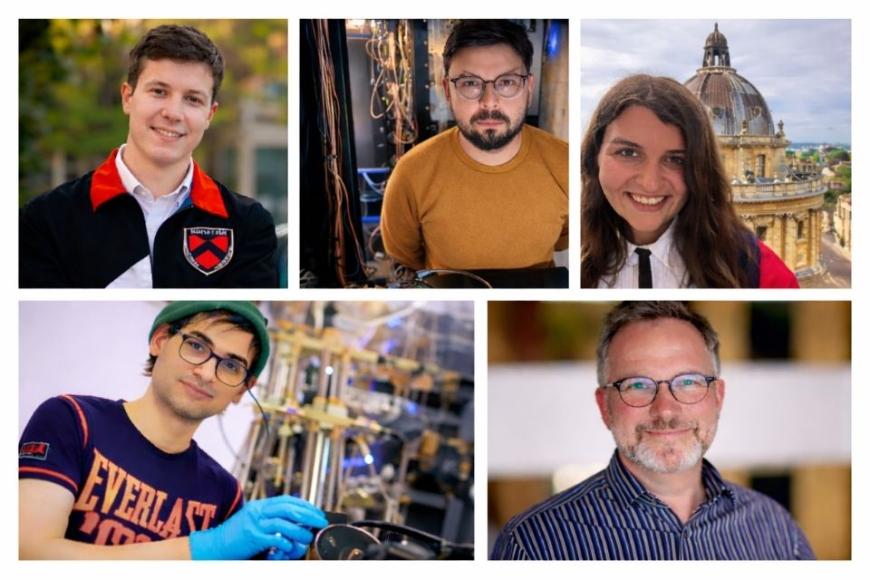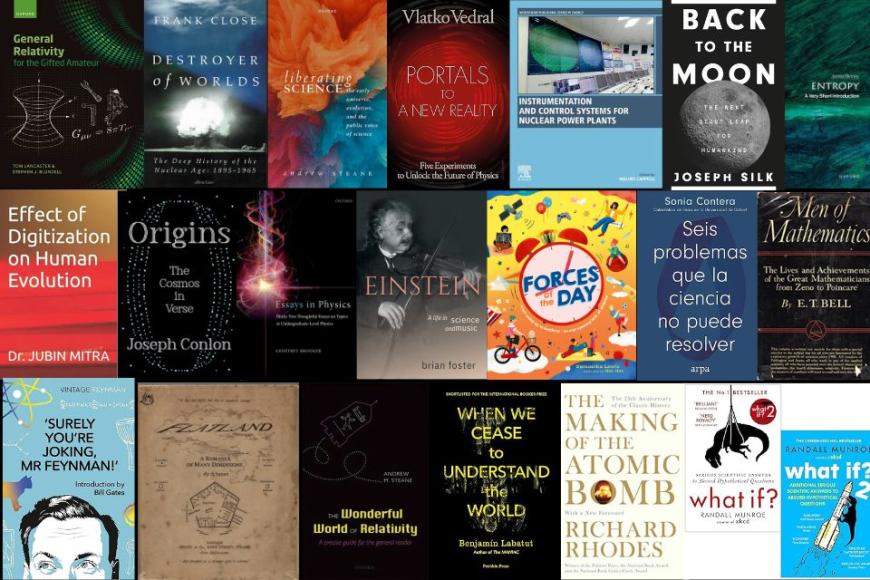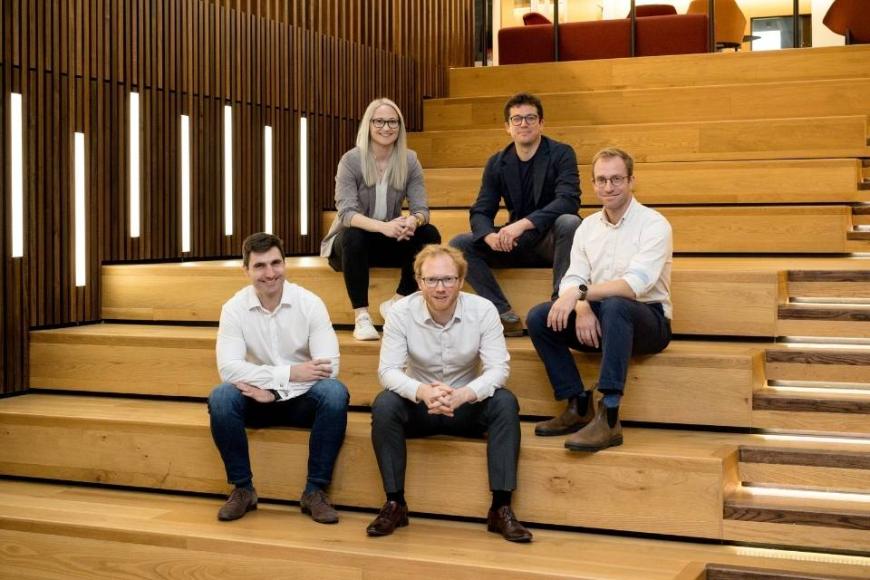 2025 was declared the International Year of Quantum Science and Technology (IYQ) – marking 100 years since the initial development of quantum mechanics. A lot has happened since then and there is a lot still to happen. Oxford – and Oxford’s Department of Physics – is at the forefront of the second quantum revolution researching and developing the technologies that will shape our future. Find out more about how our research is building the quantum technologies of tomorrow, how we are educating and inspiring future pioneers of quantum technology and how our research is being applied to real life, right now.
2025 was declared the International Year of Quantum Science and Technology (IYQ) – marking 100 years since the initial development of quantum mechanics. A lot has happened since then and there is a lot still to happen. Oxford – and Oxford’s Department of Physics – is at the forefront of the second quantum revolution researching and developing the technologies that will shape our future. Find out more about how our research is building the quantum technologies of tomorrow, how we are educating and inspiring future pioneers of quantum technology and how our research is being applied to real life, right now.
World-leading research

Researchers in the Department of Physics work across a range of quantum technologies. When it comes to quantum information and computation, we study how quantum-mechanical systems store and manipulate information. Our research includes both seeking fundamental insights, as well as exploiting these phenomena to build quantum computers.
We use precision control of atoms and light to explore and exploit the quantum realm. The remarkable ability to cool atoms with laser light provides experimental access to a vast array of quantum physics allowing the detailed study of intricate many-body quantum phenomena and the manipulation of atoms with photons on the single particle level.
Meanwhile, in our work on quantum materials, we are actively studying quantum matter, exposing a variety of materials to different experimental techniques in order to gain a better understanding of quantum theories of matter and to exploit the findings for the next generation of functional materials and devices.
Such research requires specialist facilities and the ultra-low-vibration laboratories in the Department of Physics’ flagship Beecroft Building were opened in 2018 specifically to facilitate this cutting-edge research. The laboratories have been built several storeys underground sandwiched between heavy concrete keel slabs that sit on air springs and the resulting conditions allow for the highest levels of precision for optical laser laboratories and atomic level microscopy.
Oxford: centre of excellence
With Oxford's broad interdisciplinary research capability in quantum technologies, it is ideally placed to facilitate collaboration on an institutional and national scale. Institutionally, the recently formed Oxford Quantum Institute brings together Oxford University’s world-leading expertise in quantum science and technology uniting researchers from the departments of Physics, Engineering Science, Materials, Chemistry, Computer Science and the Mathematical Institute as well as Philosophy and is one of the broadest and most significant groupings in the UK.
Nationally, the Quantum Computing via Integrated and Interconnected Implementations (QCi3) hub, part of the UK's programme to develop quantum technologies, is the third successive hub to be led by Oxford. It follows on from the UK Quantum Computing and Simulation (QCS) hub and the Networked Quantum Information Technologies (NQIT) hub. QCi3 brings together leading UK academic and industry partners to tackle key challenges and accelerate progress in quantum computing.
Study: teaching the next generation

Ensuring that our students are in the best position possible to lead the way in quantum science and technologies, the Department of Physics has introduced the brand new MSc in Quantum Technologies. It is an interdisciplinary course that provides a technical overview of modern quantum technologies for computing, sensing and communications and underpinning science. The course has an emphasis on industry connections, practical training and research projects and has been designed for those who want to lead our quantum future in industry or academia. It is taught in an interdisciplinary form across the departments of Physics, Engineering, Computer Science, Materials, Chemistry and the Mathematical Institute.
At PhD level, there are programmes across the University and in Physics, postgraduates can probe the frontiers of trapped ion quantum computing or the properties of ultracold quantum gases with a DPhil in Atomic and Laser Physics or explore quantum magnetism or visualise quantum matter at the atomic scale with a DPhil in Condensed Matter Physics. Alternatively, postgraduates can join the EPSRC Centre for Doctoral Training in Superconductivity where they will be developing superconductors for quantum computing.
Real-life application
Highly successful businesses have grown out of Department of Physics research with many harnessing the potential of quantum physics. Oxford Quantum Circuits was founded in 2017 and is focussed on developing a scalable quantum-computing technology based on superconducting circuits. Oxford Ionics followed suit in 2019 building quantum computers based on electronically controlled trapped ion qubits while Orca Computing, also founded in 2019, is building a scalable and flexible quantum computer powered by photonics. Mach42 develops and commercialises acceleration and optimisation software for quantum physics and was also founded in 2019 while Quantum Dice was founded in 2020 and provides quantum security for encryption. The latest spinout from the Department of Physics is Quantum Fabrix and it focuses on trapped ions to deliver scalable products for quantum computing, communication, and sensing. All of these ventures are helping to bring the benefits of quantum technologies into everyday life – with potential to transform diagnostics in personalised healthcare, reduce the impacts of climate change or improve cyber security.
Physics for all
We work with local schools and community groups to share our research and passion for physics. To mark the International Year of Quantum, many of our events will have a special focus on quantum technologies. There will be public lectures, panel discussions and showcase events, as well as new activities, such as virtual lab tours with interactive features and blog posts – all carefully designed to raise awareness of the transformative power of physics and future potential of quantum technologies. Our aim is to help people understand these complex technologies and how they might impact lives as well as to share the personal stories of our researchers. To keep up to date, join the physics public mailing list for regular updates.






